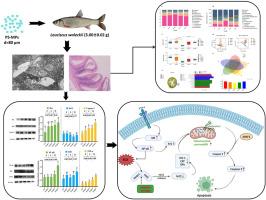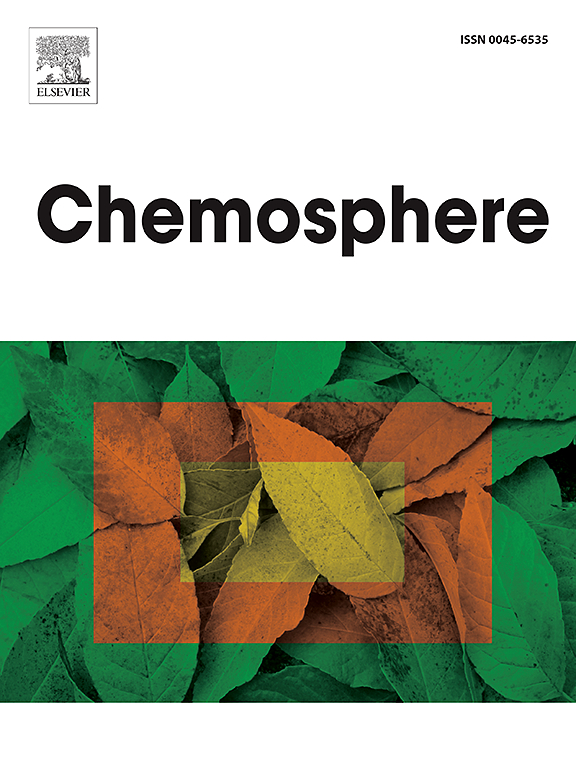Mechanisms underlying mitochondrial dysfunction and intestinal damage induced by ingestion of microplastics in Leuciscus waleckii: The role of the NF-κB/Nrf2 signaling pathway
IF 8.1
2区 环境科学与生态学
Q1 ENVIRONMENTAL SCIENCES
引用次数: 0
Abstract
This study investigates the impact of polystyrene microplastics (PS-MPs) on the growth, immunity, oxidative stress, mitochondrial function, and intestinal health of Leuciscus waleckii (3.00 ± 0.02 g) juveniles over 8 weeks. Our findings indicate that exposure to PS-MPs negatively affected the growth of Leuciscus waleckii, resulting in digestive disturbances. Furthermore, PS-MPs triggered immune dysfunction and oxidative stress through the activation of the NF-κB pathway and suppression of the Nrf2 signaling cascade. PS-MPs damaged intestinal tissue and compromised the intestinal barrier. Additionally, mitochondrial homeostasis was disrupted, activating endogenous mitochondrial apoptotic pathways, ultimately leading to cell apoptosis. High-throughput 16S rRNA sequencing disclosed that PS-MPs provoked shifts in the intestinal microbiota. Mantel analysis indicates significant correlations between growth parameters and the activities of enzymes related to antioxidant defense, immunity, apoptosis, and mitochondria, as well as with the gut microbiota. In summary, our study reveals that PS-MPs induce intestinal inflammation and oxidative stress in Leuciscus waleckii by activating the NF-κB pathway and the intrinsic mitochondrial apoptotic pathway while repressing the Nrf2 signaling, ultimately leading to cellular apoptosis, mitochondrial dysfunction, intestinal microbiota imbalance, and growth inhibition.

微塑料摄入诱导海鲮线粒体功能障碍和肠道损伤的机制:NF-κB/Nrf2信号通路的作用。
本研究调查了聚苯乙烯微塑料(PS-MPs)对海鲈幼鱼(3.00±0.02 克)的生长、免疫、氧化应激、线粒体功能和肠道健康的影响。我们的研究结果表明,接触 PS-MPs 会对海鯈鱼的生长产生负面影响,导致消化功能紊乱。此外,PS-MPs 还通过激活 NF-κB 通路和抑制 Nrf2 信号级联,引发免疫功能紊乱和氧化应激。PS-MPs 会破坏肠道组织,损害肠道屏障。此外,线粒体平衡被破坏,激活了内源性线粒体凋亡途径,最终导致细胞凋亡。高通量 16S rRNA 测序显示,PS-MPs 引起了肠道微生物群的变化。曼特尔分析表明,生长参数与抗氧化防御、免疫、细胞凋亡和线粒体相关酶的活性以及肠道微生物群之间存在明显的相关性。总之,我们的研究揭示了 PS-MPs 通过激活 NF-κB 通路和线粒体内在凋亡通路,同时抑制 Nrf2 信号传导,诱导核桃蛭的肠道炎症和氧化应激,最终导致细胞凋亡、线粒体功能障碍、肠道微生物群失衡和生长抑制。
本文章由计算机程序翻译,如有差异,请以英文原文为准。
求助全文
约1分钟内获得全文
求助全文
来源期刊

Chemosphere
环境科学-环境科学
CiteScore
15.80
自引率
8.00%
发文量
4975
审稿时长
3.4 months
期刊介绍:
Chemosphere, being an international multidisciplinary journal, is dedicated to publishing original communications and review articles on chemicals in the environment. The scope covers a wide range of topics, including the identification, quantification, behavior, fate, toxicology, treatment, and remediation of chemicals in the bio-, hydro-, litho-, and atmosphere, ensuring the broad dissemination of research in this field.
 求助内容:
求助内容: 应助结果提醒方式:
应助结果提醒方式:


